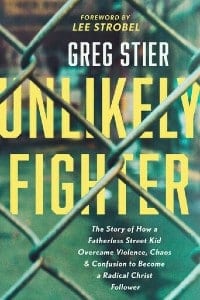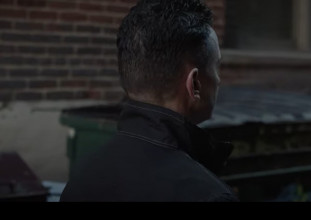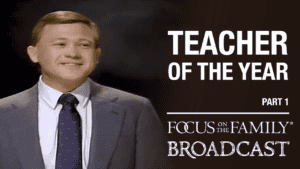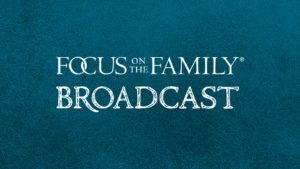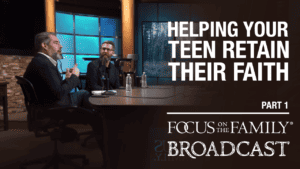John Fuller: Today on Focus on the Family with your host, Jim Daly, we’re gonna hear the remarkable story of one man’s violent dysfunctional family and how God redeemed his traumatic past in some pretty unexpected ways. Here’s how Greg Stier describes his early childhood.
Greg Stier: I come from a family filled with bodybuilding, tobacco chewing, beer drinking thugs.
John: Hmm.
Greg: And that’s just the women. It was a-
John: (laughs).
Greg: It was a, it was a really a rough family growing up. Three of my uncles were title-winning bodybuilders, and my fourth uncle could bench press 500 pounds, and my fifth uncle was a Golden Gloves boxer. And my mom was the sole sister in the group and they were all terrified of her. And they were a very violent family. And I, you know, I use a lot of illustrations when I preach, they’re kind of funny, but it really wasn’t funny to me as a kid growing up. I was a scared little kid in this family.
Jim Daly: John, man, you can imagine? Yeah, I’d be scared too with-
John: (laughs).
Jim: … those uncles around you. That, uh-
John: That sounds wild.
Jim: Five hundred pounds, that’s a lot to bench press.
John: Hmm.
Jim: But if you didn’t grow up in that kind of environment, you might scratch your head and not understand the emotional trauma of all of that-
John: Mm-hmm.
Jim: … and what you have to go through. And, uh, Greg’s gonna share that story with us, uh, today and next time. The fact is, here at Focus, we hear from a lot of people that have gone through traumatic experiences. And what’s so amazing is that God loses nothing. You know, for those that maybe have gone from mountaintop to mountaintop, man, be blessed and be humble-
John: Mm-hmm.
Jim: … that you had that kind of experience. Good parents, a good household. That’s wonderful. That’s the way it should work. But for those of us that had a lot of valleys, um, I think God says, “Don’t turn your back on that. Don’t be resentful for that. Let Me use it in your life to shape you and make you better.”
John: Mm-hmm.
Jim: And our guest today is gonna describe exactly how he, the Lord used that situation of his upbringing to draw him closer to Christ, and then for Christ to use him in some amazing ways.
John: Yeah, I’d agree. And, uh, Greg Stier is an evangelist, author, speaker, and the founder of Dare to Share, a youth Evangelism and leadership training ministry that he started back in 1991. Uh, Greg has written 20 books. And one that we’ll hear about today is called Unlikely Fighter: The Story of How a Fatherless Street Kid Overcame Violence, Chaos, and Confusion to Become a Radical Christ Follower. And we’ve got copies of that book here at the ministry. Stop by focusonthefamily.com/broadcast. Or give us a call. 800, the letter A, and the word FAMILY.
Jim: Greg, welcome to Focus on the Family.
Greg: So glad to be here.
Jim: It’s good to have you, and I’m- I’m really excited about getting into your story because there are so many people coming from dysfunctional families today. You know, I remember back when I was a kid, there were only two of us I remember at my high school that their parents weren’t married. Uh, uh, me and another guy. But now, it’s so common, and, uh, the brokenness in homes, so common. Uh, our stories have become kind of the mainline story.
Jim: Yeah. Describe your- your uncles. They sound like incredibly athletic crazy people, but (laughing)… I mean, bench-pressing 500 pounds.
Greg: My- my family, they were huge. They worked out for maximum punching power-
Jim: That was their goal?
Greg: That was their goal.
Jim: Wow.
Greg: And the Denver mafia, the Smaldones, had a nickname for my uncles. They called them the Crazy Brothers.
Jim: How’d they get that title?
Greg: Because they did crazy things. They were, they would just do anything to fight. And, um, they were just known around North Denver.
Jim: Yeah, I think in the book you mentioned that kind of kept them out of a lot of stuff, because everybody was afraid of them.
Greg: Yeah, they were terrified of them. You know, I think of my Uncle Jack, he was a bodybuilder, street fighter, and in and out of jail his whole life. Once went to jail for choking two cops unconscious at the same time who were trying to arrest him on assault charges.
Jim: Oh my.
Greg: Um, my Uncle Bob, uh, got in a barroom brawl with a guy. Literally beat the guy to death. Thank the Lord that later on they were able to resuscitate the guy. But I could just go through, you know, story after story of uncle after uncle, uh, immense and intense violence. And I was the farthest thing in the world from that.
Jim: Oh, it had to scare you to death. Were you thinking somehow I have to be initiated into this stuff, or, and at what age were you cognizant that this is a violent family. How come I’m in this family?
Greg: From the time I was cognizant, I was- I was aware.
Jim: Like three, four years old?
Greg: Yeah, I was aware of that. And I was aware that I was nothing like that, and I-
Jim: Huh.
Greg: … I heard the whispers about me growing up.
Jim: Hmm.
Greg: That, “We need to toughen this kid up.” And my cousins were tough, my aunts and uncles were tough, my ma was tough. Everybody was tough in the family except for me.
Jim: And those- those uncles were your mom’s brothers, correct?
Greg: Yeah. Yeah, so she had, uh, five brothers, and she was the only girl in the group. And she was tough. She wielded a baseball bat. She was like the woman at the well with a baseball bat. (laughs).
Jim: (laughs). Wow.
Greg: So, a tough, tough lady, and, um-
Jim: She actually beat somebody up with a baseball bat, correct?
Greg: When I was five years old in North Denver, I was playing on the porch, and a guy pulled up in a brand-new car, and I focused my eyes. And it was one of the guys my mom had married that had left us, and we had no idea where he had been. And I yelled inside, “Mommy, mommy, one of my daddies is here.”
Jim: Huh.
Greg: And she said, “Where’s the bat?” And I had a plastic bat, I go, “Here.” And she didn’t want that, she wanted the Louisville Slugger so she reaches behind the door, grabs the baseball bat, cigarette still hanging out of her mouth, runs out, shatters his front windshield, takes out his headlights, knocks off his rear view mirror, and then, uh, his side mirror, and she’s like, “Get out of the car.” She’s tempt- you know, daring him, “Get out of the car,” uh, in between curse words. And then, he made a tactical mistake. He got out of the car (laughing).
Jim: Right.
Greg: And she beat him so bloody. I remember as a kid, I joke about it now, but it actually traumatized me as a kid because-
Jim: Oh, of course.
Greg: … it, she absolutely just beat him bloody. Finally, he ended up back in the car, drove off, and I remember thinking three things as she walked back up. Number one, I will never disobey my mommy again.
Jim: (laughs).
Greg: Right?
John: Wow.
Jim: Clear message there.
Greg: Clear message (laughing). Number two, how did the cigarette stay in her mouth the whole time? I mean, it never left her mouth.
Jim: Wow.
Greg: And number three, why is my ma so angry?
Jim: Hmm.
Greg: She was filled with rage.
Jim: And let’s- let’s explore that for a minute, because you’ve got this violent family that had to be part of even your childhood reasoning, like, “What is going on?” I mean, it’s amazing-
Greg: Yeah.
Jim: … you become an adult quickly in that environment. You start thinking very adult-like.
Greg: You did.
Jim: And so, how, as a six-, seven-, eight-year-old boy, are you processing this and justifying it, or maybe you didn’t. Or rationalizing, “Well, they must be tough because…” How did you process that?
Greg: Yeah, you know, my whole family, even my grandparents, you know, so my uncles and my ma’s parents were really tough. And so, I’m raising this, thinking, “Why is there so much violence? Why is there so much blood? And why do I not fit in?”
And when I was six years old, I had something happen to me that really made me start thinking. Uh, it was at a Christmas party, uh, we were celebrating Christmas. Well, it was Christmas morning. The whole family is at my grandparents’ house. Everybody’s opening presents. And my Uncle Dave, he’s not a bodybuilder, he was a war hero, he had 40 medals and commendations in the-
Jim: Jeez.
Greg: … Vietnam War and one tour of duty, five bullet holes. Uh, he had a five-inch bayonet scar. He not only survived, he killed the guy that gave it to him. A Golden Gloves boxer, Judo champion, war hero.
Jim: Mm-hmm.
Greg: A man’s man.
Jim: Yeah.
Greg: At the end of opening presents, right before lunch, Uncle Dave goes, “I have one more present. It’s for little Greg.” And nobody ever called me out like that. So, for the first time, I got six-year-old swagger-
Jim: Yeah.
Greg: … walking across the room. He gives me a present. Everybody’s watching, all my uncles are like, “Open it up.” I open it up, it’s a girl’s doll.
Jim: Hmm.
Greg: And I think it’s a mistake. I go, “It’s a girl’s doll.” And he goes, “Yeah, I figured you don’t have a dad, so you like to play with dolls like a little girl.”
Jim: Wow.
John: Oh, my goodness.
Greg: And-
Jim: That had to crush you.
Greg: Oh, it crushed me, and it angered me. It- it’s the first time I remember being enraged.
Jim: Huh.
Greg: And I shoved it in his stomach, and I pointed at him, and I go, “I ain’t no girl,” and I walked back to my corner. And my uncles were all like, “You see the temper on him? Maybe he’s one of us after all. Ha, ha, ha.”
Jim: Hmm.
Greg: Well, it sent me into a spiral, and like you said, it sent me on a search.
Jim: Yeah.
Greg: How did I get in this family? Why am I here? What is going on with life? And it from that moment on that I- I really believed God used, in a positive way-
Jim: Right.
Greg: … to help me search for God.
Jim: Well, yeah, and-
John: Hmm.
Jim: … one of the things throughout the book, what I’m so amazed at, and, you know, I had spots of this, but your recognition of how you were different and where’s God in this whole thing? I mean, where in the world, why do you even know there is a God? How- how did, how’d that happen? I mean, what was going on in your background that you had an inkling that there was a God and He may care about you?
Greg: So, on the other side of the equation, I had my grandparents. And we-
Jim: It’s always the grandparents.
John: Mm-hmm.
Jim: (laughs).
Greg: They went to Bethany Baptist Church.
Jim: Okay.
Greg: And I think they felt guilty that most of their children had ended up so rebellious.
Jim: Yeah.
Greg: They took me and my brother to church.
John: Hmm.
Greg: And it was there that I got my little red Bible. My little King James, little red Bible, and I began with a flashlight to read underneath the kitchen sink every day to get away from the noise and the violence. I would just hide under the kitchen sink-
Jim: Wow.
Greg: … and I would search. I didn’t, I couldn’t understand half the words in it (laughing).
Jim: Sure.
Greg: But I knew the answers were in this book.
Jim: Wow.
Greg: Yeah.
Jim: I mean, that’s unbelievable.
Greg: Yeah. And that moment on June 23rd, 1974, I walked forward to get baptized with my grandfather. And, uh, Pastor Clodpeddit said, “Before you get baptized, you’re gotta be a Christian. And that means you believe that Jesus died in your place on the cross for your sins, that he rose from the dead, and if you trust in Him, you have eternal life. Have you done that?”
Jim: Hmm.
Greg: And in my mind, I did it real quick, “Jesus, I trust you.”
Jim: Ah. Yeah.
Greg: And I go, “Yes.” And I told my grandmother in the Ford F-150 truck on the way home, “Today I got it. I understood the gospel.” And she wrote in my little red Bible, which I have to this day, “On June 23rd, 1974, Greg Stier put his faith and trust in Jesus Christ.”
John: Hmm.
Jim: Yeah.
Greg: And so, that day was the gamechanger day for me.
Jim: Well, and for them too, it sounds like.
Greg: Yes.
Jim: “Finally, we have somebody in the family that gets it.” I mean, for your poor grandparents that were seeing all their kids just go crazy, right?
Greg: Oh yeah.
Jim: Let me- let me go back to something you mentioned, ’cause I- I want to make sure listeners and viewers are catching this. Uh, the problem with fatherlessness.
Greg: Yeah.
Jim: You know, this started long ago. Senator Moynihan wrote about it. A Democrat talked about the impact of fatherlessness back in 1969 and how it was going to devastate the culture if we didn’t get this righted in all families. Black families, white families, Hispanic families. You experienced it. What do you think you took away from not having the dad? I mean, obviously your uncles belittled you and teased you about it. But what other things did you both learn that were negative and positive about your experience not having a dad?
Greg: Well, on June 23rd, 1974, something shifted. You know, my mom, eighteen years ago went to be with the Lord. She was in hospice for 40 days and 40 nights, and she said, “Do…” While- while she was still cognizant, she said, “Do you remember what you used to say to the kids in the neighborhood who made fun of you for not having a dad?” I said, “I don’t remember, ma.” She said, “You used to say God’s my dad.”
John: Hmm.
Greg: And on June 23rd, 1974, God became my Heavenly Father. And I felt for the first time in my life, “I’ve got somebody who knows me and who loves me and who’s gonna give me purpose and mission.”
Jim: Yeah.
Greg: So that was a gamechanger. And I- I really feel for this generation of young people that either are fatherless, or their dad’s at home but not really at home.
Jim: Still fatherless.
Greg: To me, that’s a-
Jim: Emotionally.
Greg: … harder kind of-
Jim: Yeah.
Greg: … fatherlessness.
Jim: Just ignored.
Greg: Yeah, ignored.
Jim: Yeah. That’s tragic.
Greg: So, knowing that… And, you know, when I was 12 years old, I started asking my ma questions. Because she’d been married several times, and she’d been with a lot of men.
Jim: Well, you said, “One of my daddies is here.”
Greg: Yeah.
Jim: Yeah.
Greg: Exactly. And so, whenever George Stier called, who I assumed was my father, he’d always say, “Put your brother on the line.” And my ma would always call him Doug’s dad. And when I was 12, I went to my ma and I go, “Why do you call him Doug’s dad? And why does he never wanna talk to me? Or see me?” And she said, “Sit down, I’ve gotta tell you something.”
And so, she explained to me that she met my biological father at a party. And they partied, and she got pregnant. He was in the Army. He got transferred 2,000 miles away. When he found out, he abandoned me and my ma before I was even born. My ma got in the car, she… No, my- my ma didn’t tell me this, later on my grandmother told me this-
Jim: Hmm.
Greg: … that my ma got in the car, drove from Denver to Boston to have an illegal abortion.
John: Hmm.
Greg: This is before Roe v. Wade. Under the pretense of staying with my Uncle Tommy and Aunt Carol, my Uncle Tommy was stationed in Boston. My Uncle Tommy and Aunt Carol had put their faith in Christ by this time. They actually talked her out of it.
Jim: Huh.
Greg: She came back in shame. Had me. And oftentimes, when she would look at me, she would burst into tears. And I did not know ’til my grandma informed me about the almost, me almost being aborted, that that rage in my ma was a shame-fueled rage.
John: Hmm.
Greg: Um-
Jim: Well, for many things.
Greg: For many things.
Jim: Yeah. Let me- let me-
John: Wow.
Jim: … touch on that a little bit, because, you know, here at Focus on the Family, we’re fighting for life every day.
Greg: Yeah.
Jim: Conception to grave. And we take a lot of ridicule for that from the culture. Um, but you’re exhibit A. I mean, who… I don’t know how you have processed this, but who- who has the right to say, “You should never exist,” once you exist in your mother’s womb? I mean, I know that’s a hard decision. But looking back on your life, and even your mom and her experience with you, with all the trouble, it sounds like at the end of her life, she loved you. Maybe at the beginning, I don’t know. But God used it, like Romans 8:28 says, for good.
Greg: Yeah.
Jim: Right?
Greg: Totally, and I- I am so pro-life, uh, scripturally, theologically, biblically, but personally.
Jim: Right. You made it.
Greg: I’m glad to be here.
Jim: Right.
Greg: Right? And I’m so grateful for my Uncle Tommy and my Aunt Carol-
Jim: Yeah. Wow.
Greg: … talking my ma out of it.
John: Mmm. Well, uh, this is Focus on the Family with Jim Daly, and our guest today is Greg Stier. Uh, what a story. And there’s so much more to uncover. Uh, Greg has written about his life and God’s intervention in the book, Unlikely Fighter. We’ll encourage you to get a copy from us today. Uh, give us a call, 800, the letter A, and the word FAMILY. Or stop by focusonthefamily.com/broadcast.
Jim: Greg, I- I think we’ve painted a good picture, but I still wanna get to a couple of the stories that you had in the book that, you know, it’s kind of jaw-dropping. You had, uh, two experiences that come to my mind. One was, uh, going through a glass door, I think it was a patio door or something. And being attacked by dogs. Uh, very different things, but obviously prominent in your childhood, ’cause you talk about them in the book. Tell us those two stories and how they kinda shaped where you’re coming from.
Greg: Yeah, there’s actually several things that happened. I always felt growing up like somebody was trying to kill me, actually.
John: Mm-hmm.
Greg: It just-
Jim: Uh, yeah, I can imagine.
Greg: From the-
Jim: I mean, that’s… (laughs).
Greg: … almost being aborted to the, you know, I’m running through the house, uh, and my grandmother yelled at me, “Don’t run through the house,” and I said, “What?” And I went through the window and cut my wrists up, and almost bled out-
John: Hmm.
Greg: … uh, before she got me to the hospital. Actually, she had- she had me in the car. But she was terrified because the two white towels she had wrapped my hands and arms in were drenched blood red.
Jim: Huh.
Greg: I was bleeding out. And an African-American man, older gentleman, knocked on the window of the car-
Jim: Huh, yeah.
Greg: … and said, “Ma’am, do you need some help?” She said, “My grandson’s gonna die, and I’m too nervous to drive.” He said, “Scoot over,” and he drove us to the hospital. I got stitched up, they IV’d me up. He waited until we were done, took us back, and tipped his hat and said, “Goodbye.”
Jim: Huh.
Greg: And I- I think actually that may be the first angel. You know, it talks about-
Jim: Right.
Greg: Hebrews 13, you may meet angels, and- and unaware, and there was this man out of nowhere.
Jim: Hmm.
Greg: In a largely Hispanic neighborhood.
Jim: Right.
Greg: And it was really the first Black man I think I’ve ever seen in my life. And it was angelic. So, I felt like somebody was trying to kill me, but God kept intervening.
Jim: Isn’t that amazing?
Greg: Yeah, and-
Jim: I wonder who that guy is?
Greg: I don’t know.
Jim: Yeah.
Greg: But I can’t wait to meet- to meet him in heaven someday, you know?
Jim: Yeah. Talk about showing up at the right time.
Greg: So then, there was another time, actually probably the most terrifying time for me. I was I think eight years old. I was walking to Brown Elementary School in North Denver, had a 10-block walk. It was cold. Uh, I had talked my ma somehow into buying me this discounted leather jacket, ’cause it was during the days of Happy Days, the sitcom.
Jim: Right.
Greg: But I’m so glad my ma gave in, ’cause I’m walking to school, and there always these two German Shepherds across the street that were loose, so I’d always walk on the other side of the street. Well, one day in late October, I look up, two German Shepherds coming across the street like a beeline right at me, ears back, teeth bared. I know I’m gonna get attacked. I back up against the chain link fence, I cover my face, I grab the chain link fence, one with each hand, I’m holding on for dear life. One goes for my face, one goes for my stomach, and they start trying to tear me down. For like five minutes, it felt like an hour.
Jim: Yeah.
Greg: And I am screaming. And my- my fingers are weakening and I’m starting to slip. I’m screaming. And a little old lady from down the street, Ma Zeimer, this 80-year-old, stringy little old lady, comes shuffling down the street with a baseball bat and crack, she hits one in the head. Hits the other in the head. Jumps in between, uh, the dogs and me, and swinging that bat, cursing. And that little old lady, Ma Zeimer, saved my life.
John: Hmm.
Greg: And I’ll never forget, taking the jacket off it looked like I had chickenpox. None of the teeth had gotten through the leather, but it bruised my arm in so many ways. It was weird, ’cause after that I never saw the dogs again. And I wondered what had happened. Twenty years later, my grandmother told me, she goes, “Oh, you don’t… I never told you what happened to those dogs?” I go, “No.” She says, “Grandpa went down that night, knocked on the guy’s door,” who owned the dogs and always let ’em loose. The guy opened the door and he said, “Hey, your two dogs attacked my grandson today.” And he said, “Yeah, well, he lived,” and tried to shut the door. My grandfather put his foot in the door, pulled out a .357 Magnum, and said, “I have three bullets in this gun, two for your dogs and one for you. If I see them in the yard, outside the yard, around the yard tonight, you’re all gone tomorrow.” And the guy got rid of the dogs.
John: Hmm.
Jim: Wow.
Greg: So.
Jim: I mean, that… Again, it paints such a powerful picture of an environment for you that’s full of insecurity. And-
Greg: Insecurity and under- not understanding… Although my grandfather and grandmother are Baptists, you know, they’re still pretty violent.
John: Tough Baptists. (laughs).
Greg: Yeah, tough Baptists. Don’t mess with them Baptists, man.
John: (laughs).
Greg: (laughs).
Jim: Isn’t that the truth? Um-
Greg: Yeah.
Jim: And again, the question so many people have, and they ask me about this, like, “How did you have an open heart to God, given every negative-
Greg: Mm-hmm.
Jim: … experience you had?” And you had some more traumatic experiences than I did. Um, so I’ll pose that question to you, ’cause it is kinda the million dollar question. How did you keep your eyes on God during this time as a little boy that made your heart even supple toward Him? How come you didn’t have this terrible resentment against your runaway dad? And then this resentment towards these fake fathers, if I could call them that, dads that weren’t your dads that your mom was beating up with a baseball bat. I mean, … So many men stand in front of me with tears and say, “How did you not get resentful? How did you not become so bitter?” ‘Cause that’s where they’re at.
Greg: Yeah.
Jim: Forty, fifty years after their childhood experience. I struggle to answer that question.
Greg: Hmm.
Jim: Because it’s just like, “I don’t know. It’s just something God provided me, was a heart for him.” And you could see it- it’s not enough for them. How do you answer that?
Greg: Well, I would say it’s a two part answer. One is God was the only thing that made sense in my life. I mean, once-
Jim: Yeah (laughing).
Greg: … I understood the gospel, I wasn’t afraid of dying. I wasn’t afraid of anything. I had hope and I had purpose. So that took place, and it was a gamechanger. But when I found out, when I was 12 years old, about my biological father-
Jim: Mm-hmm.
John: Mm-hmm.
Greg: … I did have bitterness. As a matter of fact, people would ask me, “What are gonna do if- if you ever meet your dad?” And I- I was like, “I’m gonna kill him.” I hated my-
Jim: You had that-
Greg: … dad.
Jim: You did have that.
Greg: I did have that, because-
Jim: Yeah.
Greg: … I didn’t hate God, but I hated whoever this man was that abandoned me and my ma before I was even born.
Jim: Yeah.
Greg: And it took three years for me to navigate that.
Jim: You know, and I- I just am mindful that there are men and women listening that can’t divide that. I’m thinking of someone very, very specific right now-
John: Hmm.
Jim: … who doesn’t have a relationship with- with Christ because of their earthly father.
Greg: Yeah.
Jim: And had said to me, “Hey, if that’s an earthly father, why do I need a Heavenly Father?” That’s exactly what you need.
Greg: Mm-hmm. Yeah.
Jim: Because the Heavenly Father is not like this earthly father. But it- it does become a barrier for a person-
Greg: Yeah.
Jim: … because they’ve never experienced love. They’ve never experienced appropriate affection from a father. So, they can’t translate it.
Greg: Yeah.
Jim: And they just think of God as being an old grandpa with a stick who’s waiting to beat me up if I fall out of line.
Greg: Yeah, for me God was the only father worth having, and-
Jim: Amen.
Greg: You know, it took three years, I was at a seminar when I was 15 years old, with our little Christian school, where the guy speaking talked about, “You need to forgive your dads. And whatever your dad has done to you is nothing compared to what we did to our Heavenly Father.
John: Hmm.
Greg: And Jesus died in our place for our sin. He sacrificed His own son for… He forgave us through faith alone in Him. And whatever your dad has done, you can forgive them.” And I remember in that, then the Denver Coliseum, bawling my eyes out and saying, “I forgive you, dad.”
John: Oh.
Jim: Hmm.
Greg: It took three years, but man, I’m so grateful I forgave him.
John: Hmm, what a note to conclude this first part of our conversation with Greg Stier on Focus on the Family, and we do hope you’ll make plans now to join us for part two next time.
Jim: Well, that really is remarkable to see how God was working through all the traumatic experiences in Greg’s life. Uh, despite the violence and chaos and the desperate brokenness in his family, uh, Greg miraculously found the Lord. I’d rather say the Lord never left him, right?
John: Mm-hmm.
Jim: He was always by his side. But in that, he found hope for a better life and a better future.
Uh, here at Focus, we hear from many, uh, dysfunctional and hurting families like Greg’s. Couples who are separated or divorced, parents who have a child in crisis, health issues, job loss. All kinds of families that are desperately needing help. And thanks to the generosity of friends like you, we’ve been there to encourage and rescue and give these families hope.
In fact, uh, we have a campaign going on right now where good friends to the ministry have provided a matching gift opportunity that will allow us to strengthen more marriages and equip more parents, and, uh, share the good news of God with more people this year and into the next year.
That’s why your support of Focus on the Family is critical to help us finish this year strong and be ready to reach even more families in 2023.
And if you’ve given to Focus in the past, let me say thank you for that. We really appreciate your partnership with us. And if you haven’t given, or it’s been a while since, uh, we’ve heard from you, please consider a monthly pledge or a one-time gift so that together we can meet the needs of these hurting families.
John: And we’d love to hear from you when you call 800, the letter A, and the word FAMILY. 800-232-6459. Or donate and double your support today, uh, thanks to this matching opportunity at focusonthefamily.com/broadcast.
And if you’re able to make a monthly pledge, or a one-time gift of any amount to Focus on the Family today, we’ll say thanks by sending a copy of Greg’s book, Unlikely Fighter. And we’ll include with that the audio download of our entire conversation with him.
Jim: Uh, John, I’m sure there are some people listening right now who are reminded of wounds in their past. Uh, perhaps there was childhood trauma, or you’re facing a struggle right now in your family, and you need the help and hope we’ve been talking about. Let us connect you with one of our caring Christian counselors. Uh, we provide this service free to anyone who needs it, and we’re here to help you in any way we can.
John: And again, our number, we’re just a phone call away, is 800, the letter A, and the word FAMILY. Or stop by focusonthefamily.com/broadcast.
We’ll hear more from Greg Stier next time as he shares about his faith journey and how God has used him to reach his family for Christ.
Greg: Here, so I was 11 or 12 years old when I went to Yankee’s Youth Ministry. I got trained to share the gospel. That’s one of the things that Yankee would do right away, he’d give you a Bible and say, “You’re gonna learn this.” Give you a stack of tracks, “You’re gonna learn how to share the gospel.” And so, he equipped us how to do that. Well, the first person on my mind was my ma.










